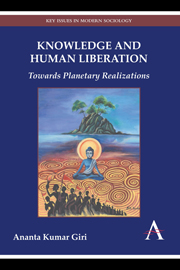Book contents
- Frontmatter
- Contents
- Preface
- Acknowledgments
- Foreword
- Introduction: The Calling of Transformative Knowledge
- Part I Nurturing the Garden of Transformational Knowledge: Roots and Variants
- Part II Rethinking Knowledge
- Part III Aspirations and Struggles for Liberation: Towards Planetary Realizations
- 12 Rethinking the Politics and Ethics of Consumption: Dialogues with “Swadeshi” Movements and Gandhi
- 13 Swaraj as Blossoming: Compassion, Confrontation and a New Art of Integration
- 14 Civil Society and the Calling of Self-Development
- 15 The Calling of Practical Spirituality: Transformations in Science and Religion and New Dialogues on Self, Transcendence and Society
- 16 Spiritual Cultivation for a Secular Society
- 17 Cosmopolitanism and Beyond: Towards Planetary Realizations
- Afterword
- Advance Praise
12 - Rethinking the Politics and Ethics of Consumption: Dialogues with “Swadeshi” Movements and Gandhi
from Part III - Aspirations and Struggles for Liberation: Towards Planetary Realizations
Published online by Cambridge University Press: 05 May 2013
- Frontmatter
- Contents
- Preface
- Acknowledgments
- Foreword
- Introduction: The Calling of Transformative Knowledge
- Part I Nurturing the Garden of Transformational Knowledge: Roots and Variants
- Part II Rethinking Knowledge
- Part III Aspirations and Struggles for Liberation: Towards Planetary Realizations
- 12 Rethinking the Politics and Ethics of Consumption: Dialogues with “Swadeshi” Movements and Gandhi
- 13 Swaraj as Blossoming: Compassion, Confrontation and a New Art of Integration
- 14 Civil Society and the Calling of Self-Development
- 15 The Calling of Practical Spirituality: Transformations in Science and Religion and New Dialogues on Self, Transcendence and Society
- 16 Spiritual Cultivation for a Secular Society
- 17 Cosmopolitanism and Beyond: Towards Planetary Realizations
- Afterword
- Advance Praise
Summary
Boycott is much more than a mere economical device, it is a rediscovery of national self-respect… The American struggle with England began in an enthusiastic and determined boycott of British goods enforced by much the same methods as the Indian boycott but with a much more stringent and effective organization. The Italian uprising of 1848 was heralded by the boycott of Austrian cigarettes and the tobacco riots of Milan. The boycott was the indispensable weapon of the Parnell movement in Ireland, and boycott and Swadeshi are the leading cries of Sinn Fein… In India also Boycott began as an assertion of national self-respect… The economical boycott has been on the whole an immense success… But now the whole weight of bureaucratic power is being brought to bear in order to shatter the boycott, and if we intend to save it we must oppose the organized force of bureaucracy by the organized will of people.
—Sri Aurobindo, Bande Mataram (1907, 501–2)By patronizing foreign cloth we have committed a deep sin. [In taking the Swadeshi vow] we desire to do penance for our sins, that we desire to resuscitate the almost lost art of hand-weaving, and that we are determined to save our Hindustan crores of rupees which go out of it annually in exchange for the cloth we receive… The Swadeshi vow is not derived from any extraneous happening, whereas boycott is a purely worldly and political weapon. It is rooted in ill-will and a desire for punishment… One who wishes to be a Satyagrahi forever cannot participate in any boycott movement and a perpetual Satyagraha is impossible without Swadeshi.
—M. K. Gandhi, The Swadeshi Vow (1919, 196–7)- Type
- Chapter
- Information
- Knowledge and Human LiberationTowards Planetary Realizations, pp. 205 - 218Publisher: Anthem PressPrint publication year: 2013

